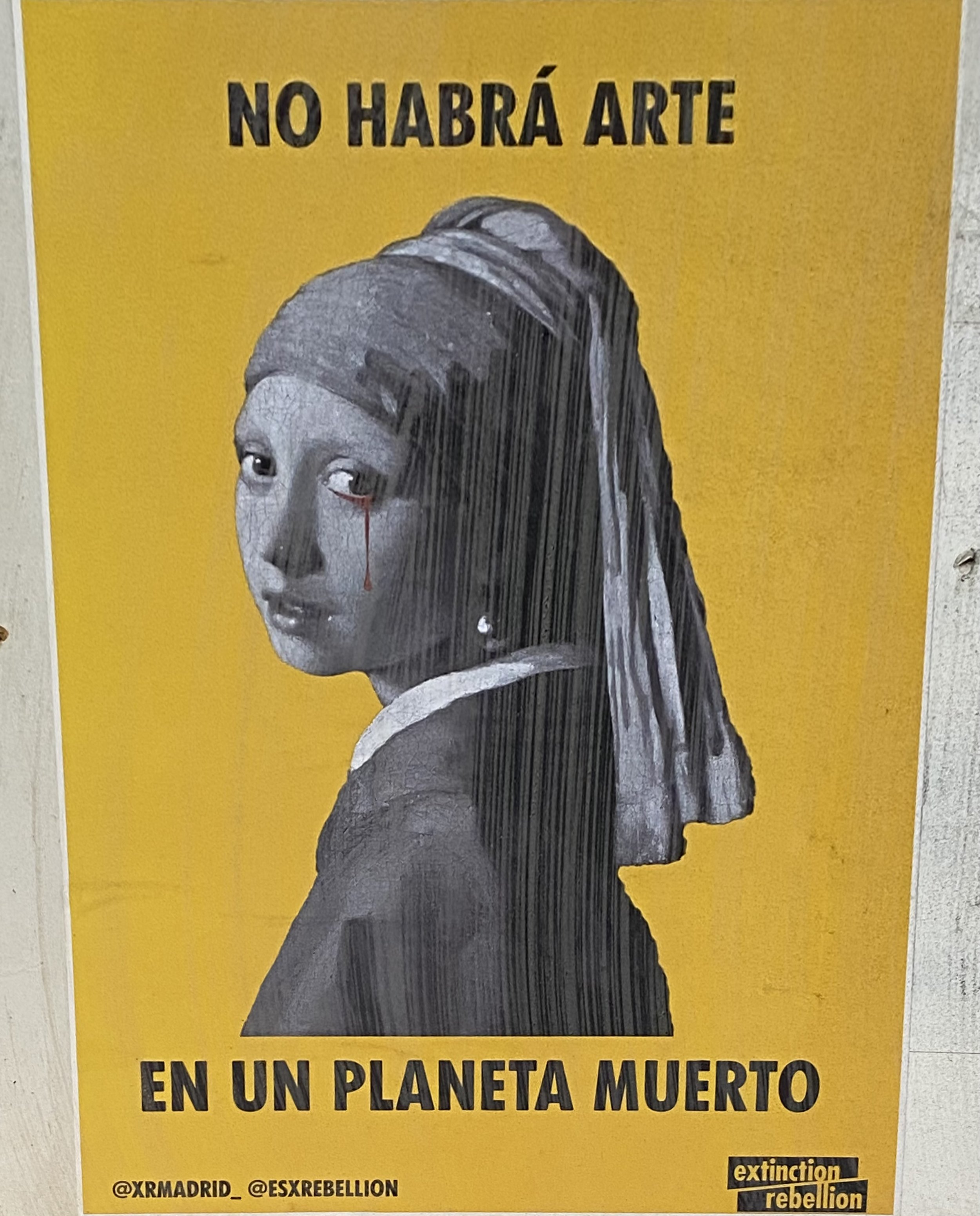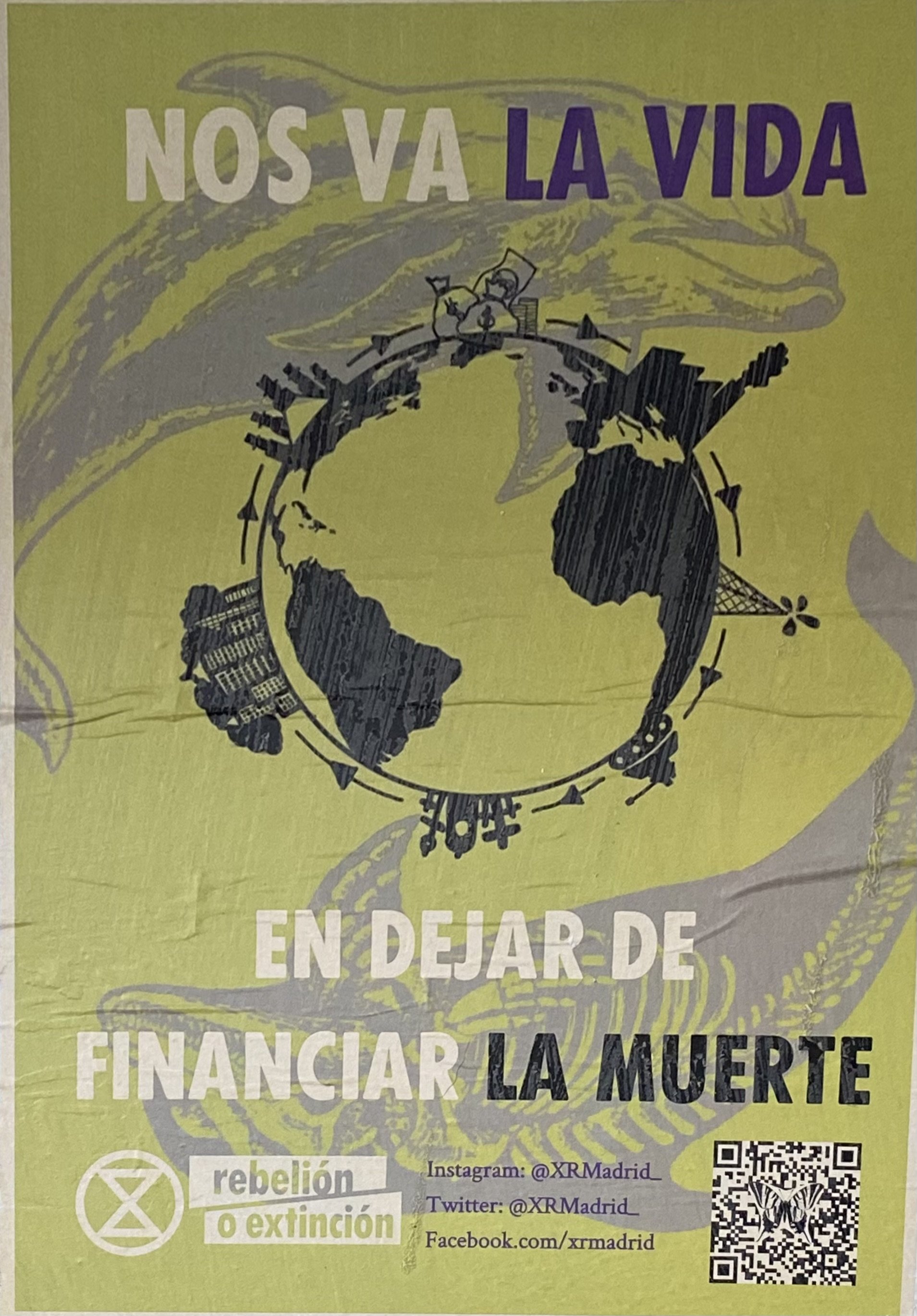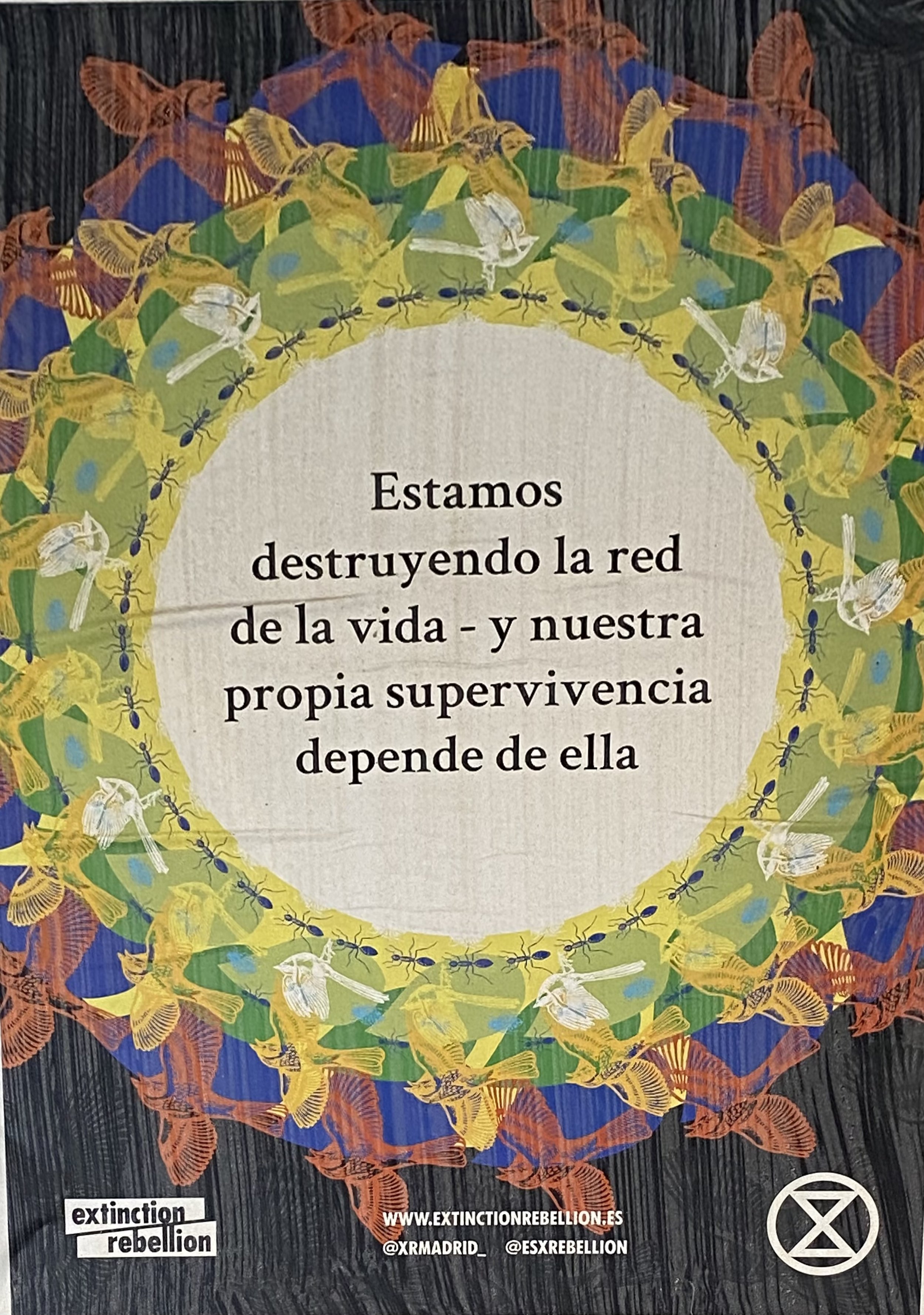Lavapiés: The Perfect Place for Rebellion
Back side of Lavapiés metro stop entrance. (All images courtesy of the author.)
Since January 2022, Spain, like much of Europe, has suffered a prolonged drought exacerbated by climate change. Luckily, activist groups such as Extinction Rebellion are paving the way for a revolution to fight the destruction caused by our inaction against climate change. Recently I came across some of Extinction Rebellion’s powerful visuals while walking through the Lavapiés neighborhood in the Spanish capital, Madrid.
Multiculturalism and Gentrification
Getting off the metro and emerging under the blue sky into the bustling action of people in the plaza, I was eager to explore. The sweet smell of fresh fruit wafted through the air from the fruit and vegetable products shop located to the right of the metro stop. A lady read on a bench smoking a cigarette, my nose crinkled. Construction workers took a break from their day by sipping on energy drinks they had just bought at the Carrefour that sits across from the stop.
My first time in Lavapiés was required for a class presentation during my semester abroad in Madrid. The trip was a blessing in disguise; I learned that Lavapiés is the heart of Madrid’s diverse and multicultural community as well as a hub for the city’s street art movement, hosting the famous Tabacalera, a cultural art space located in an old Tobacco Factory of Madrid.
Once comprising the Jewish quarters of Madrid, Lavapiés is now home to more than 80 nationalities. As you walk through the streets, you hear languages such as French, Chinese, Spanish, and Arabic. The shops and bars on every corner reflect this international community.
But as a multicultural epicenter that was named the “coolest” neighborhood in Madrid, it has attracted tourists and other Spanish residents, giving rise to gentrification in Lavapies. Large corporations such as BBVA bank and Ibis hotels have settled right off of the metro stop while travel agency firms are splattered across the neighborhood. A real estate agency by the name of La Casa advertises properties for prices exceeding US$150,000.
Immigrants searching for reasonably priced rental housing simply cannot afford to live there any more and are being forced to leave. Lavapiés is a relatively impoverished area, and most of its inhabitants are people of color. For greedy companies, this space is an opportunity for exploitation and environmental injustice. As a result, Lavapiés is also the perfect place for a call to action, perseverance, and persistence.
A gentrified Lavapiés showing an Ibis budget hotel.
Extinction Rebellion: Poster power
As I strolled along the steep streets working on my class assignment, I came across five posters located above an abandoned restaurant whose windows are covered in graffiti. Other posters as well as pictures of Kobe Bryant, a yellow lab, and a cupcake cover the walls above the restaurant, too.
Situated above the gutted restaurant are tan brick apartments that peer out onto a dry fountain. The backside of the looming, big, red Reina Sofia museum (home to Pablo Picasso’s legendary Guernica) is nearby. This is a quieter part of Lavapiés. Surrounded by other apartment buildings new and old, a tobacco shop, cleaning store, bakery, electric services shop, and public parking garage, the space holds a comforting feel that caters to the public.
Close-up of the graffitied windows of the abandoned restaurant.
Organizations such as Extinction Rebellion, who created these posters, are working to bring attention to the effects of climate change on our planet. Their captivating messages are meant to motivate action. I knew immediately I had to research their values and purpose in relation to the water scarcity dilemma in Spain, an ongoing discussion I have heard within the homes of my host families and in the classrooms here.
The first two posters that struck me read in Spanish, “There is no art on a dead planet”. Personally adoring art, the thought of a world in which these famous works by renowned artists could be lost is devastating to me. Each poster depicts a different well-known work: “Girl with a Pearl Earring” by Johannes Vermeer and “The Nobleman with his Hand on his Chest” by El Greco. What separates these paintings from their originals is the bloody teardrop running down their cheeks - a symbol of ultimate despair and death.
Next, I drew my attention to the following two posters. The first, decorated with birds and ants, states in Spanish, “We are destroying the web of life - and our own survival depends on it”. The second depicts dolphins and whales in the foreground with our Earth being circled by money, power plants, tanks, polluted cities, and graves. It states, “Our lives are at stake in ceasing to finance death”.
If our Earth has provided us with a plethora of goods and opportunities for the development of humankind, the least we can do is treat it with kindness in order to ensure the continuation of our species.
Money and power hungry corporations are at the helm of our world’s destruction, and in the process, they gamble with our lives. What they fail to realize is the future and current generations' dependence on the Earth. Ultimately, we need the Earth more than it needs us. A good place to begin change would be to dismantle the large industrial corporations that rely on the burning of fossil fuels and couple this step with a sharp transition to clean energy.
The final poster calls upon the viewer to account for their own actions. It reads, “Papa, what did you do against the climate crisis?” When I saw it, questions started swirling in my mind about how my daily life contributes to further catastrophic eradication and how I can get more involved in the cause that organizations such as Extinction Rebellion are promoting. This poster made me anxious, accomplishing its goal.
“Papa what did you do against the climate crisis?”
Extinction Rebellion’s demands
After being struck by these posters, I began to seek opportunities to become more involved in the movement working against the imminent climate catastrophe humans have created. I attended a Zoom meeting with some Extinction Rebellion members who told me that their organization educates the public and demands action through non-violent protests, workshops, and regenerative culture.
The science is clear, they say: we need change, and our governments are not acting accordingly. Extinction Rebellion has four basic demands:
Climate Justice: Governments need to prioritize groups suffering oppression and vulnerability and ensure social, climate, and ecological justice.
Tell the Truth: Governments need to be honest. A climate and ecological emergency needs to be called into action.
Act Now- We must take immediate action to stop the loss of biodiversity and reduce greenhouse gas emission to net zero by 2025. The Paris Climate Accord should have spurred significant action amongst governments but it has not.
Citizen Assemblies- Governments should work with the Citizens’ Assembly (a randomly selected representative group of people that deliberate upon and propose suggestions on certain or sets of issues) when making decisions on ecological and climate justice. Working with the Citizens’ Assembly provides a more personal perspective of the wants and needs of the citizens. Actions within this collective are more deliberative.
Spain’s drought
As I was shuttled into my homestay in Malága for the first part of my study abroad program in Spain, the first thing that I was told after being shown the bathroom was to conserve water. “Shut off the water when you are not using it! It costs too much!” my homestay mother Esperanza said in a scolding voice. Water is a crucial and valuable resource and, like much of the rest of the world, Spain is currently experiencing a prolonged drought.
However, this dramatically changes in different parts of the country. Places in southern Spain such as Murcia are paying up to five times more for water than their sister communities in the north. When I asked Esperanza about how her bill was affected, she said “detrimental, a 20% increase.” The scarce water resources and associated price hikes have been a true blow to the pockets of many Spaniards, making water a delicacy.
As a result of the rising prices, many restrictions have been put into place to minimize water waste. Showers are limited to five minutes, and people have been encouraged to shut off the water when soaping up. Many municipal fountains have been turned off, and in some cases, private water companies have the power to alert authorities if households are consuming too much water.
Though this is necessary for Spain, I believe that most people in the world should enact these practices into their daily lives in order to help minimize water consumption and promote water conservation.
Spain has proven to be particularly vulnerable to the climate change-induced drought plaguing much of Europe. According to a recent report by the Ministry for the Ecological Transition, Spain’s water reservoirs were 10% lower in August 2022 than a year prior. WWF España estimates that Spain is one of the most vulnerable European countries facing stress on its water supply, with 75% of its land at risk of desertification.
In order to deal with its emergent water crisis, the Spanish government has enacted some mitigation efforts. Its five year Hydrological Plan aims to “prioritize the uses of water, manage large floods and droughts and define ecological flows that ensure the protection of waters and their ecosystem”. Spaniards are hopeful that with this plan, they can begin to ease the difficulties caused by drought.
When coupled with climate change, Spain’s lack of investment in their water infrastructure has culminated in water scarcity and subsequent suffering among the people. Climate change does not discriminate, and therefore all are at risk. While groups like Extinction Rebellion and measures like Spain’s Hydrological Plan are working to combat the lived effects of climate change, we still have a long way to go. The imminent changes to our environment demand immediate action; if we do not work to combat it now, we are approaching an even drier Earth, or worse, mass extinction.








